It seems that Withings finally has its mojo back.
After they were bought by Nokia, they entered what was more or less the dark ages for the company. We saw little to no innovation, and in fact, moving backwards in some product areas. It simply wasn’t a good fit.
However, last year Withings bought themselves back. Or rather, Withings original founder bought the company back from Nokia. And, it seems like they’re on the right course again.
Here at CES 2019 they announced a small pile of devices, including two new activity trackers and one blood pressure monitor. But, for this post I’m going to just focus on the new $129 Move ECG activity tracker that sports, as the name implies, ECG functionality. In effect, doing the exact same thing that Apple just rolled out to their $400 Series 4 watches last month. This would be an FDA approved ECG medical device (though, the nuances of that are a bit messy as we saw with Apple). Withings is using the same exact program/class as Apple is.
In any case, if you want to see it all in one tidy 3-minute video (seriously, when do I ever manage to keep it within 3 minutes?!?), then view on below:

Otherwise, on with an equally tidy post.
How it works:
For those familiar with the Withings lineup of activity trackers, the goal of them has long been to look like a regular analog watch. While internally they’ve got all the smarts of a fancy Fitbit, externally they appear like normal watches of yesteryear. The company started off with expensive Swiss-made $400 units, but over time moved down to more affordable watches in the low $100 range. With CES 2019 they drop that price even further with the basic Withings Move, which comes in at $69. They come in a large pile of colors as seen below.
It tracks sleep, steps, allows you to specify a goal for activity, and has automatic workout recognition too. Additionally, it can be paired up to a smartphone to record GPS workouts, by pressing a button on the watch (though, you can’t see any stats on the watch from that GPS track). Oh, and it’s water resistant to 50 meters and has an 18 month (yes, month) battery life.
Not to mention that unlike Garmin, Fitbit, and Apple, the company even has a smart sleep alarm using vibration alerts on your wrist that are based on the optimal moment in your sleep phase. It’s all pretty cool for any activity tracker below $200, let alone one for $69. Note that there’s no optical HR at that price point (Withings has other watches that do that). Oh, and it ships February 5th, 2019.
But that’s not what this post is about. It’s about the ECG bits. For that, you’ll need the also announced Withings Move ECG. It’s just like the Withings Move but with a TLA after its name, and a nifty coin-sized chunk of electrocardiogram goodness inset into the back of the device:
Above are both the Withings Move and Move ECG side by side. You can see the Move to the left doesn’t have that secondary disc on the underside of the watch, while the Move ECG does.
To obtain an ECG reading you’ve got one and a half options. You can open up the app to view the process in real-time, or, you can do it sans-app whenever you want and it’ll sync to the app later on for viewing. So, same core function, but slightly different ways of viewing things.
If you’ve got the app open, all you need to do is to take your other hand and place two fingers on the edge of the watch. This completes the circuit, so to speak, and the watch will start a 20-second countdown, during which time it’s taking a reading:
After the reading is complete you can play back the reading, as well as get a diagnosis message at the top of the screen indicating whether you should go see a doctor.
Additionally, you can send the ECG via PDF to your doctor (or other interested person). Essentially, it’s exactly as Apple offers, but at 1/3rd the price.
Right now the Move ECG variant won’t start shipping until Q2 2019. From talking to Withings, that sounds like a mid-Q2 type of timeframe, but they say it’ll be heavily dependent on FDA certification, more so than their own internal timelines. Additionally, for European audiences (since Withings is a Parisian based company), they’ll be obtaining the EU equivalence of this, which they believe they’ll be able to do within that same timeframe.
Going forward:
I’m impressed by this move, and even more by the price point. And not just of the Move ECG at $129, but also of the Move at $69. I’ve gotta believe folks at Fitbit and Garmin are doing a double-take on that. I think most were hoping to see some minor announcements by the company at CES this year, but didn’t expect some legit competitive options.
The challenge Withings will have though is getting back into the market. When Nokia bought them out they were atop their game. Not just from a product development standpoint, but also arguably more important aspects like retailer depth/availability, as well as even silly things like media relations. A few years down the road and many retailers have stopped carrying their products, and many relationships in the media landscape have faded as people moved on. They’re going to have to rebuild those in order to be successful as a company.
Not to mention the larger activity tracker marketplace has evolved too. It hasn’t decreased, but it’s far more competitive than it was when Withings first started. Still, I think what they showed here is that they didn’t come into the market with another blah overpriced product. Both of these wearable entrants are exceedingly well priced (perhaps too well in fact), and have unique features at their respective price points – significantly undercutting the competition.
It’s a good start, and hopefully it pays off for them. I’ll be looking forward to testing both Move variants (as well as clearing out some other Withings device backlogged items in my pile) over the next few months.
With that – thanks for reading!
–
Follow along on Twitter for all the latest news from CES 2019, plus subscribe on YouTube where I’ll be putting out more content than usual from CES this year!
FOUND THIS POST USEFUL? SUPPORT THE SITE!
Hopefully, you found this post useful. The website is really a labor of love, so please consider becoming a DC RAINMAKER Supporter. This gets you an ad-free experience, and access to our (mostly) bi-monthly behind-the-scenes video series of “Shed Talkin’”.
Support DCRainMaker - Shop on Amazon
Otherwise, perhaps consider using the below link if shopping on Amazon. As an Amazon Associate, I earn from qualifying purchases. It doesn’t cost you anything extra, but your purchases help support this website a lot. It could simply be buying toilet paper, or this pizza oven we use and love.

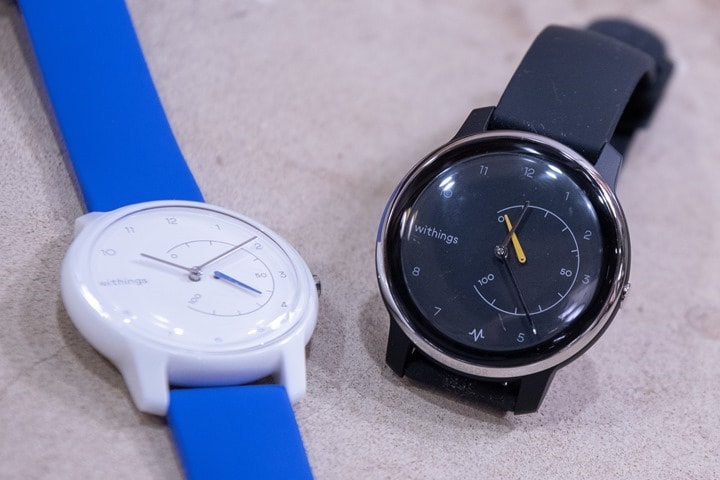
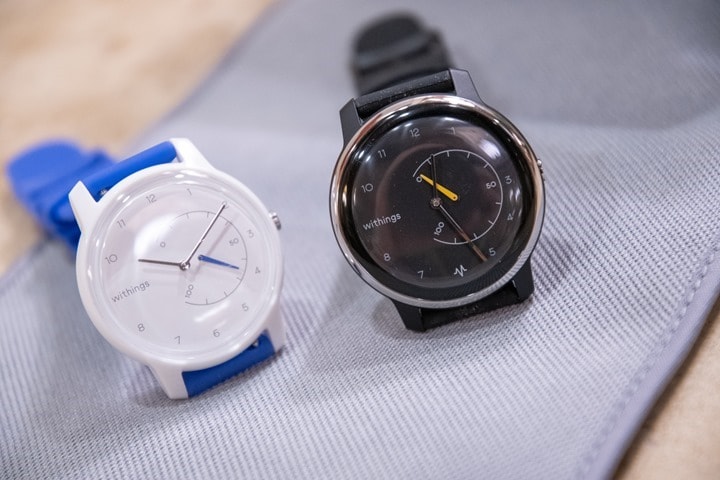
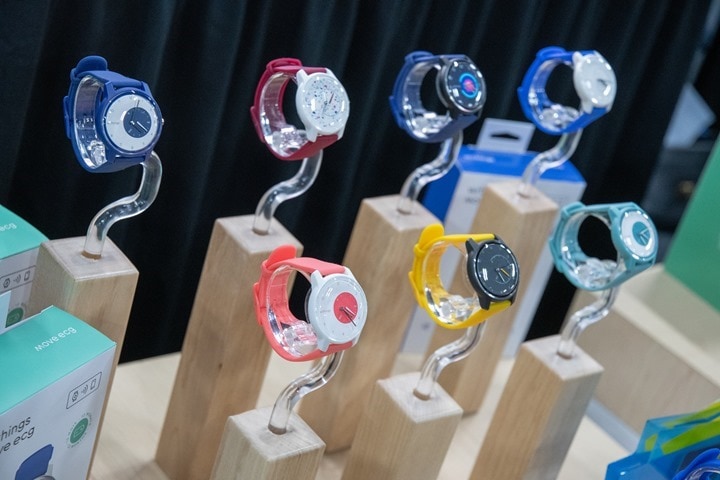
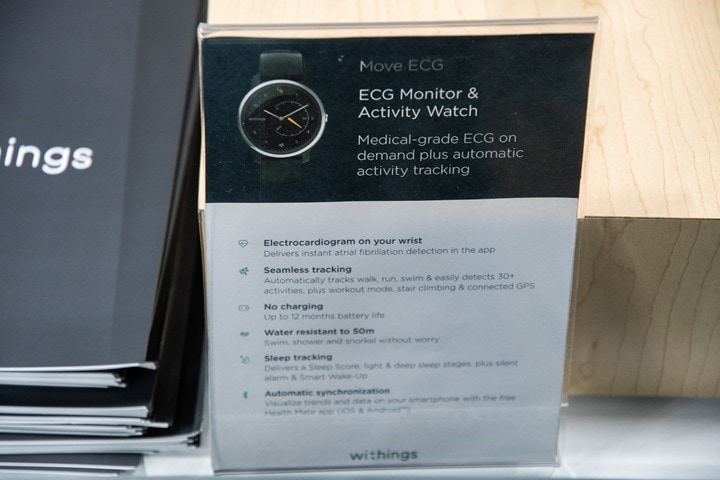
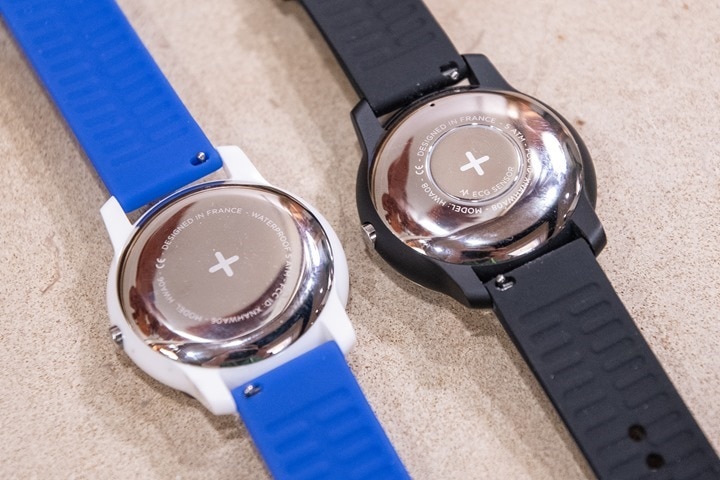
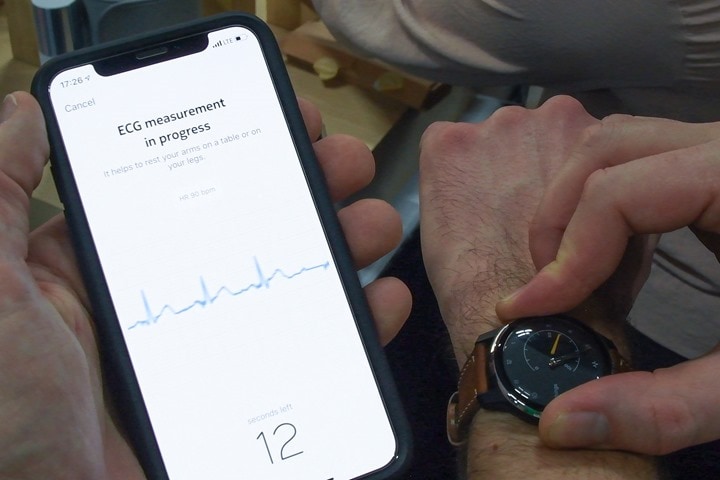
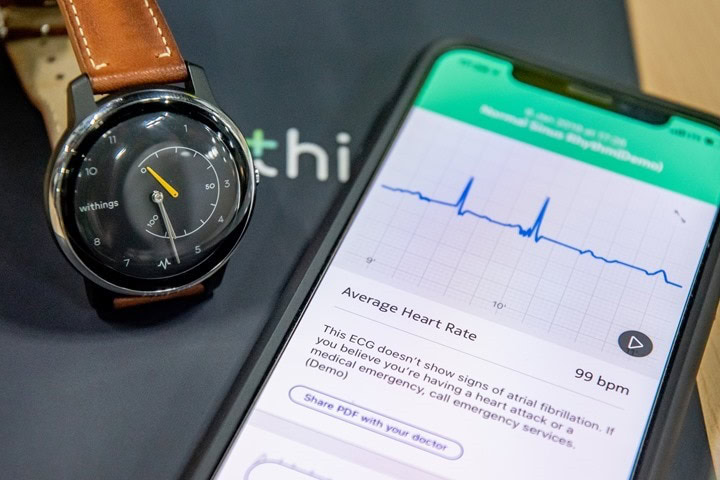
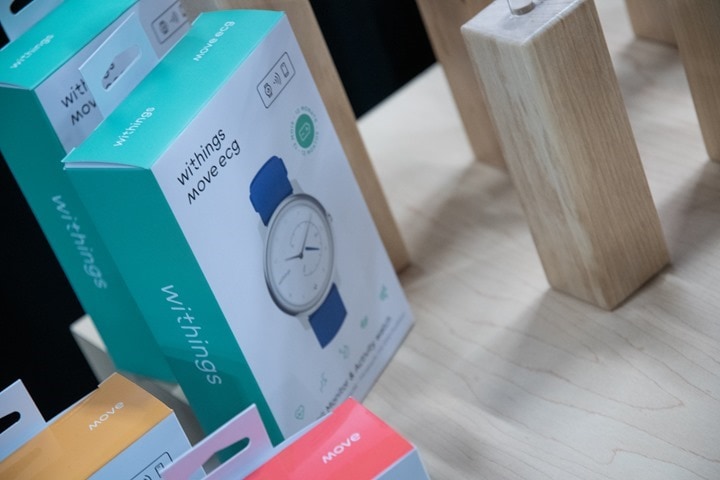





















Interesting short review. Thanks ! Can’t wait to see how you test/compare the ECG part.
The black watch with saddle brown band is really sharp looking…
As a medical doctor, I’m really concerned about these ECG devices. What they are doing is screening a likely healthy population for a ‘disease’ which NOBODY KNOWS if treatments are beneficial or harmful. There have been no studies examining the treatment of atrial fibrillation in the likely target population and, often in medicine, the ‘common sense’ that treatment has to be better than no treatment is wrong. FDA approval will only cover the accuracy of the device, not the benefits or harms of using it. I won’t be buying one, in the same way as I wouldn’t have a PSA blood test….
I have to agree. How many extra, pointless, visits to Doctors / ED / A&E will be driven by these?
“but doctor – my watch says to, so you’re wrong!”.
As a non-doctor myself, I can completely understand your reservations. I even think you probably underestimate how much everyone agrees with you… No one sane would have much of a blind faith in medical information given by a fitness tracker – actually I bet anyone who like me has a much more common continuous HR monitor on their wrist mostly see it as a “nice to know” kinda thing, not a main measure of their health (I’m not talking of an HR monitor for sport-related activities obviously the usefulness is more obvious there).
But I do think that in the grand scheme of things, data with a lot of noise is not completely useless data. Combine information from different trackers, self-evaluation from a patient, and other things (like maybe regular check-ups with actual doctors or nurses), mix this with actual health data (e.g. who actually ends up having a diagnosed condition) and weight all of these data points with a good amount of data science and machine learning and stuff, and you might just eventually get some really useful data that allows doing some serious prevention for serious diseases.
And in that sense, getting these trackers out there would actually provide the best data input for learning about what they’re worth! So in a way I wouldn’t buy this tracker because it has ECG, but I definitely welcome the move from the makers, and I do expect that their usefulness will improve with time and end up being a massive moneymaker for the companies who do it best. You do have to start somewhere don’t you?
What I can see coming is that it’s going to take effort from the patients to understand that the data is not to be trusted too much, but it’s also going to take some effort from the doctors to work with the fact that medical stuff is not happening only in the practices anymore. And yes, maybe 99% of times someone comes worried that they have a heart problem it’s going to be a false alarm, but if the remaining 1% allows early detection of such a problem isn’t that a massive benefit? Isn’t the community in agreement at the moment that the best medical advance left to be done is prevention?
@Gordon Freeman
You seem to be suggesting that more data = better.
Two things.
1 – The hard part about finding a needle in a haystack is dealing with all the hay.
2 – Even if you find the needle, if there is no effective treatment with outcomes better than the disease then acting on the needle is going to cause harm at the population level, even if a few individuals benefit. Not to put words in their mouth, but this is what Chris G. appears to be talking about WRT the PSA test. Why the pap smear guidelines have changed towards less testing. And the PSA test and pap smear are far better tests.
ML is already producing better diagnosis than human doctors in many scenarios. The issue is having the data to train a model on in the first place so I agree that getting these devices out there is a good thing. I also agree with Dr Chris above that what the watch is saying right now doesn’t help. That’s the fault of doctors though, they’ve named literally everything and a device being able to spot that thing and name it just means the words are used more often.
Medicine is in the dark ages compared to most science due to the impact of getting it wrong and the medical club approach to preventing outsiders taking part. Devices and data collection like this might allow us a faster advancement than we’d have otherwise seen, and will see non-doctors getting more involved too which can only be good since engineers and mathematicians have a lot to offer here. People collecting information on diet, weight, BP and other metrics including exercise will blow away a lot of the assumption based advice we currently have. Fat, red meat, alcohol, real butter, cholesterol are all on the list of things doctors used to KNOW were bad for you but later studies have shown not to be an issue at all.
Maybe in our lifetime we’ll see a move away from surgery/butchery and drugs being the primary response too. Probably not in the USA at first, but the rest of the world are certainly moving in that direction.
We’ll need 40 years of good data to get good reliable information at an individual level though, so I’m using these devices with a view to helping the next generation live longer and healthier. That said, ultra runners are already giving some surprising data about the heart and how much exercise is good for you!
@soap: it’s always possible that a metric ends up being really useless, i.e. that it’s just noise.
But I remember reading an article about a strategy for carmakers to measure speed more efficiently using different types of sensors. It was about how they would get more precision for their money by combining the data from sensors of different kinds that are not hugely precise than how they are doing, which is to get a very accurate sensor of a single kind.
In their example it will cost much less to get a precise speed reading by combining data from a cheap GPS, a cheap wheel rpm reader and a cheap accelerometer than by trying to have the best sensor of a single kind, e.g. having the best wheel rpm reader on the market. This is due to biases inherent to a type of sensor, e.g. a wheel rpm reading can be skewed by the tire pressure but not the other ones. And combining data allows you to apply corrections to each kind of sensor, therefore eventually improving the precision of each sensor.
This kind of thinking would probably transfer really well to medical purposes. Having only one measurement is the mistake. I’m not that versed in the PSA guidelines, but I’d bet that some of the rationale behind those guidelines were that the PSA test was too trusted. And that other metrics can help better prevent and diagnose. But they wouldn’t advise to stop the PSA test.
And although again I’m not a specialist, I can sense that the biggest challenge lies into communicating those subtleties to patients and doctors: doctors are by essence the best specialists of their domain, but the most precise prevention and diagnosis strategy probably goes towards complementing their competence with something different enough that the biases (which exist) of those different approaches overlap as little as possible.
I’m confused. I’m not a doctor, but I can put two and two together.
Object A: link to 9to5mac.com
Object B (Management Section): link to en.wikipedia.org
yes, there are clear cases like “Object A” that make you wonder how the person didn’t know they had issues before. But the accuracy of these watch ECG devices is also questionable and will lead to false positives, false negatives, extra risk from unneeded medical treatment, etc.
“For the ECG app, the FDA said they reviewed data from 588 people, about half of whom had permanent or persistent AFib. The app wasn’t able to classify about 1 out of every 10 rhythm recordings. Of the rest, 98.3% of the people who had AFib were correctly identified as having it. And 99.6% of the time, the app also correctly identified people who didn’t have AFib.”
“For the irregular rhythm notification feature, the app wasn’t as accurate. The FDA said it reviewed data from 226 participants who had to have already received an app notification suggesting they might have AFib. The participants were then continuously monitored for an average of six days with an ambulatory cardiac monitor. Approximately 41.6% of these participants had documented AFib on the ambulatory cardiac monitor. For AFib notifications that occurred on the Irregular Rhythm Notification App during the monitoring period, the proportion of individuals who also had AFib observed on the cardiac monitor was 78.9%.”
link to healthnewsreview.org
I think you have confused precision and accuracy here. Accuracy is how close a measurement is to the true value. Precision is how wide the confidence interval or margin of error or whatever is around the measurement. People often confuse the two, and assume that because something has a narrow confidence interval ore small margin of error, it must be accurate. Which is not true.
U.S. Preventive Services Task Force Does Not Recommend Afib Screening in Asymptomatic Patients link to thecardiologyadvisor.com
“The Task Force found that most older adults with previously undiagnosed AF have a stroke risk above the threshold for anticoagulant therapy and would be eligible for treatment, which is effective for stroke prevention in symptomatic adults. However, there was inadequate evidence to determine whether screening with ECG and subsequent treatment in asymptomatic adults is more effective than usual care. The harms of diagnostic follow-up and treatment resulting from abnormal ECG results are well established and include misdiagnosis and invasive testing.”
The young patient with asymptomatic atrial fibrillation: what is the evidence to leave the arrhythmia untreated? link to doi.org
“Rhythm control in young, even asymptomatic patients appears attractive assuming increased morbidity and mortality associated with AF (Table 3). However, at this time, no data exist, showing that rhythm control could prevent AF progression or even improve outcome in young AF patients. Likewise, we do not know whether the available evidence for equivalence regarding rate and rhythm control in older patients translates to young patients. Therefore, antiarrhythmic drug therapy is not warranted in asymptomatic patients due to its at best moderate efficacy at the cost of possible side effects and proarrhythmic complications. Catheter ablation on the other hand, despite encouraging results in young symptomatic patients with paroxysmal AF, does not guarantee long-term AF suppression in a significant proportion of patients and is associated with significant morbidity and mortality.”
“Therefore, until proven otherwise, it seems reasonable to follow the current recommendations to leave the arrhythmia untreated even in young asymptomatic patients. Decisions to do otherwise may be reasonable given the lack of evidence and should be discussed with each patient individually.”
Seems like a lot of fear-mongering if you ask me.
It’s funny, if you read the articles where there are doctors saying the world will end due to false positives…none of them can actually back that up. It’s been over a month since the feature was rolled out…and yet we’re not hearing any doctors of hospitals saying they’re being flooded with false-positive issues.
In fact, we’re seeing stories of the opposite: People checking with doctors when the watch brings up a concern, and finding it to be real (and previously unknown).
I’ve got no doubt there will be false positives, but that’s sorta why the device isn’t intended to replace a doctor. That’s why it’s in the specific medical class it is.
I think we are conflating two things – the accuracy (better stated as the positive predictive value) of the device – this will be poor in a population with a low pre-test probability of disease. Likely only thing wasted is time and money, but some risk of damage from medical tests.
The second – is what we do in a young fit person (which a lot of people using these devices will be) who we incidentally find AFib – answer – we have no idea medically. The assumption that ‘treatment good’ ‘no treatment bad’ is very dangerous – and is not fear mongering. Chris Cappoccia has it right…. Medical history is littered with ‘treatments’ that have been instituted without proper study and have shown net harm – that’s what I’m worried about here. This is a screening test, and screening should not be done until there is evidence that the screening produces net benefit.
@Chris G. “what we do in a young fit person..who .incidentally find AFib – answer – we have no idea medically….” Well, we would check to see if there is an underlying cardiac disease, if not, we would use the CHA2DS2-VASc score to decide if he needs treatment (e.g. anticoagulation) or not. Most likely not.
I myself wellcome publicly available gadgets that can record an ECG like the AppleWatch. The above have mentioned a lot of good arguments for and against. I still see much more benefit in this than harm. And I should mention that I am a cardiologist.
The main question here is, whether it can make 24hour recording and weather the one-line lead is satisfactory from diagnostic standpoint against the 12 ( V1, V2, V3, V4, V5, V6, I, II, III, aVF, aVL, aVR).
If yes, it can replace the holter and the ergometry in most of the cases.
Sorry Ray, but you are not the suitable subject to test this device, because your ecg is healthy…
It would be good to see how it is capturing AV block or ventricular extrasystole for example…
There’s no question that it’ll not do a 24hr recording – it was never intended to. Just like the Apple Watch isn’t. It’s intended for one-off tests, due to the way you must hold the side of the watch.
Let’s hope one day it will and they will develop this product to that point.
Otherwise, from medical standpoint, the randomly picked 20sec recording has not much meaning…
How many ecg disorders has been detected among visitors who tested the device during CES?
ECG sounds serious stuff. I hope it also measures HRV or Heart rate variability.
check: link to hrv4training.com
Looks like a gimmick. Who will really benefit from on-demand ECG? Maybe no one. It might even increase your stress and health costs for no benefit link to wired.com
It looks plasticky. Very. Plasticky. $100+ for that ?
If it looks too “plasticky” for you, then Apple will be glad to sell you a $400 watch!
I’m in. I’ve got a pre-Nokia Withings Activite’ Pop (paid $99) that I’ve had for about 3-4 years. I’ve changed the battery about once every 15 months, and replaced the silicone band ($15) after about two years. Apart from some battery-warning glitches (fixed by a software update a few years ago), it has worked like a charm.
My only complaint is that I wish the app could upload data to Training Peaks, so I can have all my activity tracked in one place. This would be for tracking daily steps and the occasional run or swim when I forget to bring my Garmin.
When I used an Activite I used an app called fitness syncer to get my activity data to TP. I don’t remember if sleep went over automatically but fitness syncer can do that too.
Very curious how Withings and Apple will handle post market surveillance, vigilance, recalls, the need to assess complaints for reportability to the FDA and other Competent Authorities within strict timelines. How many adverse events they will report. Even how they will handle things like UDI. Also curious to see what device class this will be in Europe. Too many questions I know…
I imagine they’ll do it just as badly as the incumbents. Why do you think a global company would struggle with that stuff? Especially a global company with a long history of recalling products and rectifying sometimes dangerous issues (batteries for instance). These things are just process, and those processes have been well understood for probably a century. If anything a tech company will handle those processes better through automation.
I’m not sure they’ll struggle, I’m just very interested in seeing how they handle it all.
If Withings and Apple go for certification in Europe, what class of device will it be (looks like Class 2a). Which notified body will they use? Will they certify under the current Medical Device Directive or under the new Medical Device Regulation that everyone is still trying to interpret.
With notified bodies busy adapting to the new regulation and the recent media/ICIJ focus on medical devices, it’s not the easiest time to enter the medical device market. I really hope they succeed and if they raise the bar that would be great as it would mean everyone in the industry has to get better at looking after patient safety.
As I said, curious, lots of questions and really looking forward to following their progress.
Wish my Fenix 5 did ecg readings.
Fenix 5 does do ECG that’s what the HR strap is for. The difference is that it doesn’t record a graph. This is easily changed in firmware for the HRM tri/swim since they could record internally and then transfer. Garmin also have a Bluetooth strap coming out which may support this. They’d need a new Ant+ profile and an app but both would be pretty easy with existing hardware.
Assuming this is true, the problem is, you would have to permanently wear the strap in order to record electrical heart activity the moment you need to. This is the beauty of wearables, you are always wearing them.
Another issue (in the US, at least, perhaps other locations to a more-or-less extent)… Consider a healthy subject, wearing a consumer ECG. Oh boy, the ECG reports that something is outside the normal expectations! Send that report off to my MD!
Ahem. Now what? The burden is on the MD. Ah, looks like nothing, maybe too many espressos today or maybe over exercised. Don’t worry about it. Then that person drops dead from a cardiac-related issue 24 hr later. What MD will take that risk? So, *every* report of an ECG anomaly will be investigated with a followup, clinically validated instrument/protocol. Wow, that can’t be good for health care or health care costs. And, as someone else posted (paraphrasing here) if 1% of the anomalies turn out to be a treatable problem that saves lives / reduces cost down the road…sure, that would be great. BUT, where do we draw the line? 0.1%? 0.01%? Less? Now, we don’t know the fraction of anomalies (in the consumer ECG setup) that might be treatable and help an individual or society, so all of this is speculation. Or is it? What is the data from the AW? It seems to have been available long enough with a large enough adoption rate to have *some idea* about the utility / statistics of the ECG. Anyone know?
As a cardiologist, on first hearing of such devices, I was concerned with their accuracy. After seeing the trace provided, and understanding how technology has derived to pick up the electrical signal, I am assured that the trace provided is accurate.
When i state accurate, it provides a rhythm strip, of one ‘view’ of the heart ‘electrically’. That doesn’t make a diagnosis of anything 100%, but provides a brief insight.
The main disorder that can, and is often picked up, is the silent killer ‘atrial fibrillation’. This can be caused by conduction defects, and/or ischemic changes caused by coronary insufficiency. Undiagnosed, MI’s and TIA’s are the leading follow on effect from AF.
If AF is purely down to ‘conduction’ issues, AF ablation can be performed with generally good outcomes. If the AF is due to ischemia, then investigations into the reason for that can easily be performed, sometimes leading to surgery, often to stenting, or one term medication.
The cost to the healthcare system of undiagnosed AF, is financially debilitating, but also to the family unit surrounding each patient the outcomes, untreated are devastating.
A GP can, within minutes, determine whether the trace provided is worth investigating.
I personally believe, any move to better educate and arm individuals with personal health care knowledge, can only improve the health of the wider population.
The regulating authorities in our countries, will only validate and permit devices into the market, where a clear and safe benefit to patients has been proven, and that any negative benefits or side effects have been highlighted and appropriately researched, data provided to allow the regulating authority to determine the first criteria, that a ‘clear and safe benefit’ to the patients has been met.
Interesting comments about the efficacy of ECG devices. As someone who has to have regular ECG screening for my job, I can tell you that even the professionals get it wrong, sometimes in a big way.
Having the technology is great, however incorrect interpretations of ECG data can cause real issues.
Glad to see Withings on the way up again though.
Wondering, does the ECG model do all day heart rate as well? if not is there one that does (or is it just the Steel HR and HR Sport)
I looked hard at their watches pre-nokia, and would love to pick one up now that they are back on the upswing.
No, unfortunately not. One or the other at this point.
Thanks – ill hold out a bit longer, I like the Steel HR but dont really like the cutout screen, but my Fenix 3 is still hanging in there. these are just classy enough I was hoping they do the HR in the background and just sync.
While I appreciate them going after ECG apple watch hype would be way more useful if they developed good wrist based heart rate monitor.
Until doctors support this feature it’s a gimmick soon to be forgotten
Doctors already ‘support’ this feature. Not that there’s really anything to support.
To clarify – it doesn’t matter if a doctor likes the feature or not (for whatever reason). It’s an FDA approved device.
The doctor can disagree with the readings – and that’s more than fine. They’d then do their own tests/diagnosis.
Dr Rohin Francis made a pretty good video about why there is no benefit and likely a big downside to monitoring asymptomatic afib in the healthy under 65 crowd link to youtu.be
I think this guy know what he’d talking about link: link to sgul.ac.uk
Hi Ray,
Couple of things I most curious about is whether the ECG data stream from the watch will be available for download and what the quality of ECG signal is during exercise. Could be a great opportunity for us. Cheers.
You could do an ECG during exercise, but it’s just a one-off event. No method to do it constantly beyond that point in time (20 seconds worth).
So is this basically the story of Withings under Nokia rule repeated? Big opportunity missed to write that catchy “Apple going the way of Nokia!” headline.
(with a small “in the niche field of home health tracking” added to make it not a lie)
Not sure I follow?
Withings (sans Nokia) introduced two units, both incredibly well priced. Nokia meanwhile, introduced almost nothing.
I recently purchased a Withings Move. The watch is almost exactly what I was hoping for, clean look with fun colors and exactly the basic functionality I want. However, the watch face scratches incredibly easily. I scratched mine just bumping my wrist on a table the first day I owned it and it has since picked up several more scratches. It’s still perfectly readable and I still wear it, but if scratches are going to bother you I would not recommend this watch.
Hi Ray, now the Move ECG became available to buy this week in Europe, would be great if you can fit a review in during your spare time.
Nothing on Withings in five years? Where’s the love, Ray?
Outside of a rebranded scale that only recently finally got approval to sell, they honestly haven’t done much the last 5 years in the more sports-focused realm. Instead, most of their products, including what they announced at CES, are focused on the medical side, which I don’t tend to cover.